Analysis of Cyber Law Case Studies: Seaton & Pietrylo Cases
VerifiedAdded on 2022/10/12
|9
|1725
|60
Case Study
AI Summary
This document presents a detailed analysis of two significant cyber law case studies: Seaton v. TripAdvisor and Pietrylo v. Hillstone. The Seaton case examines issues of defamation and invasion of privacy related to online reviews, while the Pietrylo case explores employee privacy and free speech in the context of social media communications. The analysis covers the facts of each case, the legal issues involved, the arguments presented by both sides, the applicable rules and precedents, and the court's conclusions. The study also provides recommendations and references relevant legal literature, including scholarly articles and case law. The document provides a comprehensive overview of these important cases and their implications for cyber law and related legal fields.
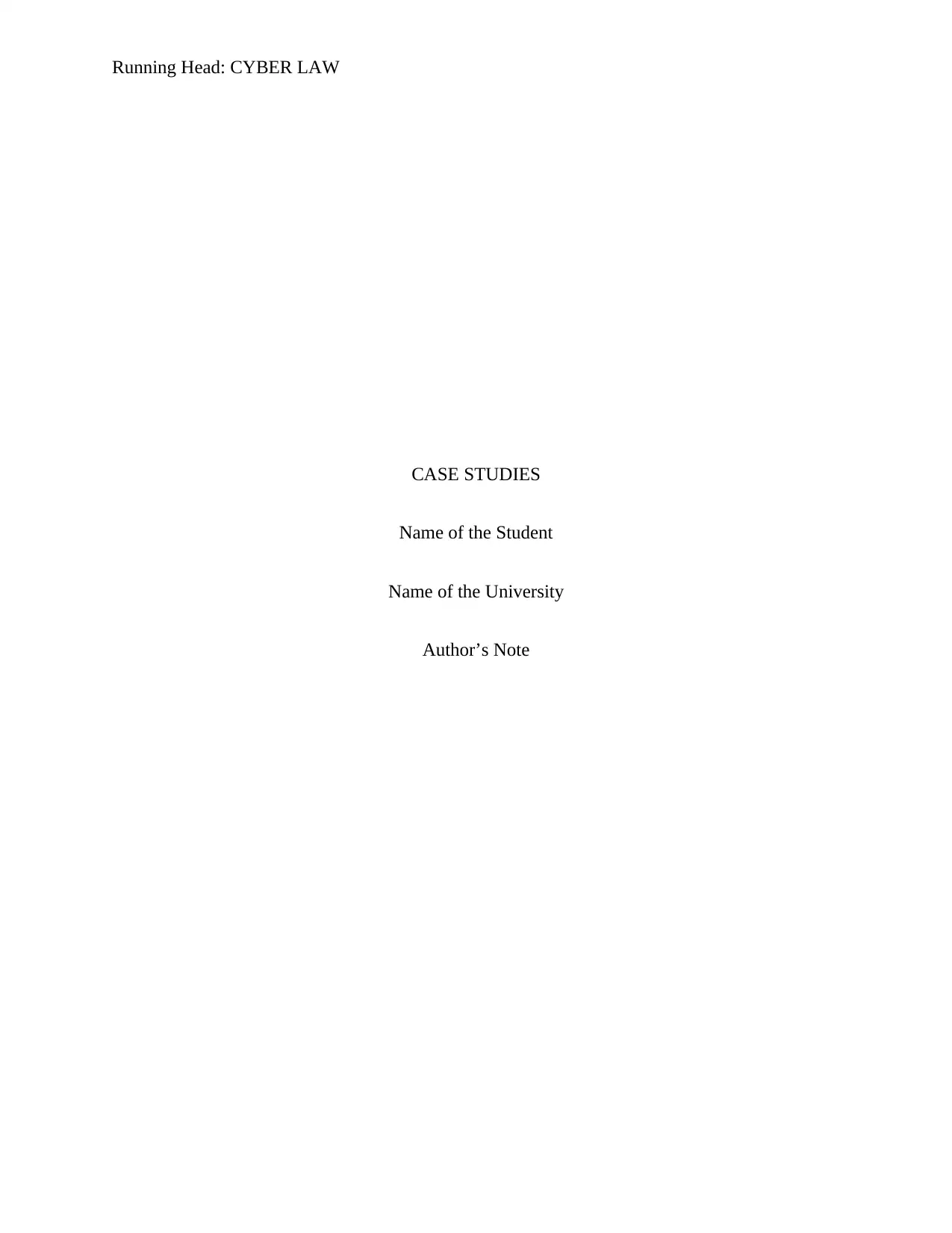
Running Head: CYBER LAW
CASE STUDIES
Name of the Student
Name of the University
Author’s Note
CASE STUDIES
Name of the Student
Name of the University
Author’s Note
Paraphrase This Document
Need a fresh take? Get an instant paraphrase of this document with our AI Paraphraser
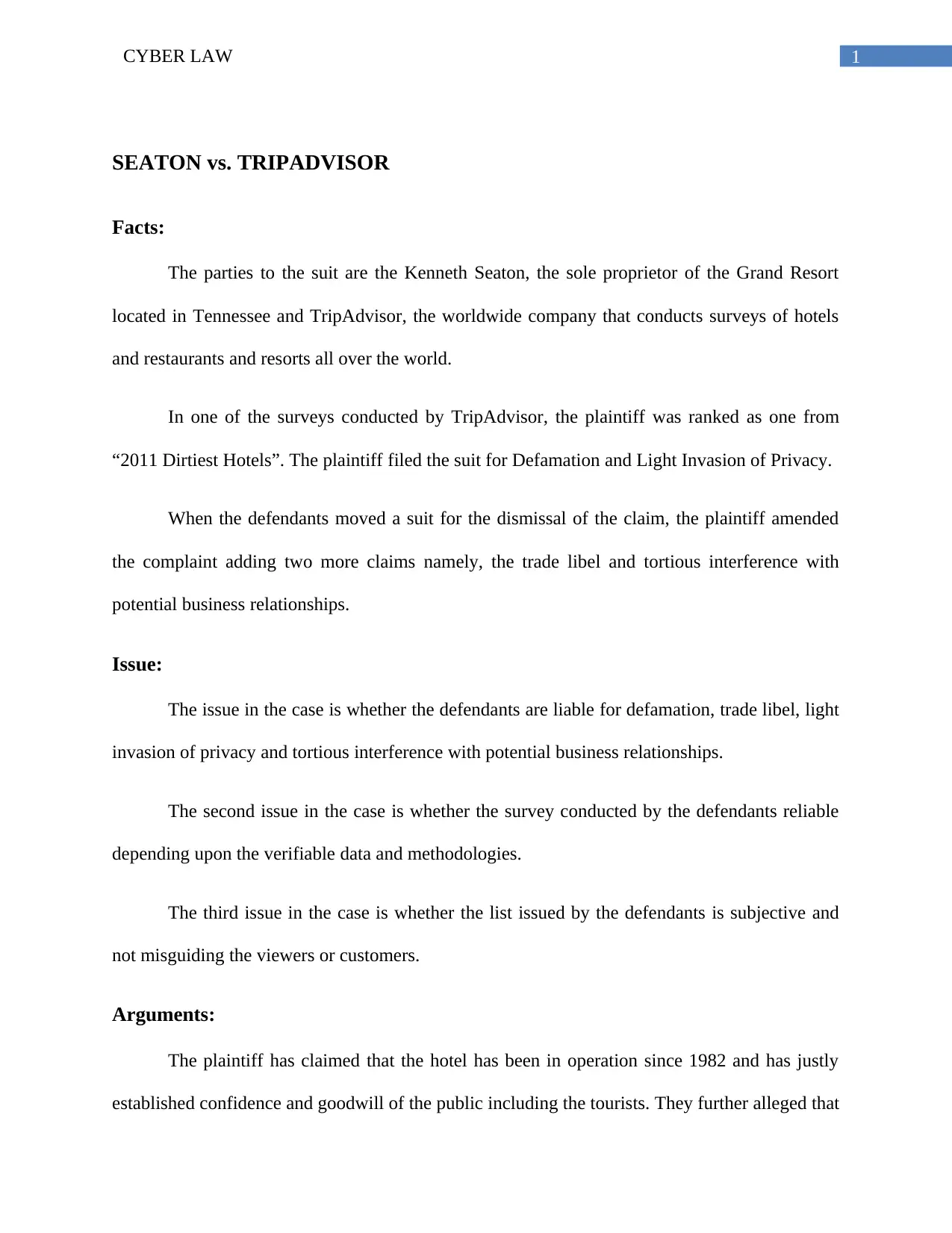
1CYBER LAW
SEATON vs. TRIPADVISOR
Facts:
The parties to the suit are the Kenneth Seaton, the sole proprietor of the Grand Resort
located in Tennessee and TripAdvisor, the worldwide company that conducts surveys of hotels
and restaurants and resorts all over the world.
In one of the surveys conducted by TripAdvisor, the plaintiff was ranked as one from
“2011 Dirtiest Hotels”. The plaintiff filed the suit for Defamation and Light Invasion of Privacy.
When the defendants moved a suit for the dismissal of the claim, the plaintiff amended
the complaint adding two more claims namely, the trade libel and tortious interference with
potential business relationships.
Issue:
The issue in the case is whether the defendants are liable for defamation, trade libel, light
invasion of privacy and tortious interference with potential business relationships.
The second issue in the case is whether the survey conducted by the defendants reliable
depending upon the verifiable data and methodologies.
The third issue in the case is whether the list issued by the defendants is subjective and
not misguiding the viewers or customers.
Arguments:
The plaintiff has claimed that the hotel has been in operation since 1982 and has justly
established confidence and goodwill of the public including the tourists. They further alleged that
SEATON vs. TRIPADVISOR
Facts:
The parties to the suit are the Kenneth Seaton, the sole proprietor of the Grand Resort
located in Tennessee and TripAdvisor, the worldwide company that conducts surveys of hotels
and restaurants and resorts all over the world.
In one of the surveys conducted by TripAdvisor, the plaintiff was ranked as one from
“2011 Dirtiest Hotels”. The plaintiff filed the suit for Defamation and Light Invasion of Privacy.
When the defendants moved a suit for the dismissal of the claim, the plaintiff amended
the complaint adding two more claims namely, the trade libel and tortious interference with
potential business relationships.
Issue:
The issue in the case is whether the defendants are liable for defamation, trade libel, light
invasion of privacy and tortious interference with potential business relationships.
The second issue in the case is whether the survey conducted by the defendants reliable
depending upon the verifiable data and methodologies.
The third issue in the case is whether the list issued by the defendants is subjective and
not misguiding the viewers or customers.
Arguments:
The plaintiff has claimed that the hotel has been in operation since 1982 and has justly
established confidence and goodwill of the public including the tourists. They further alleged that
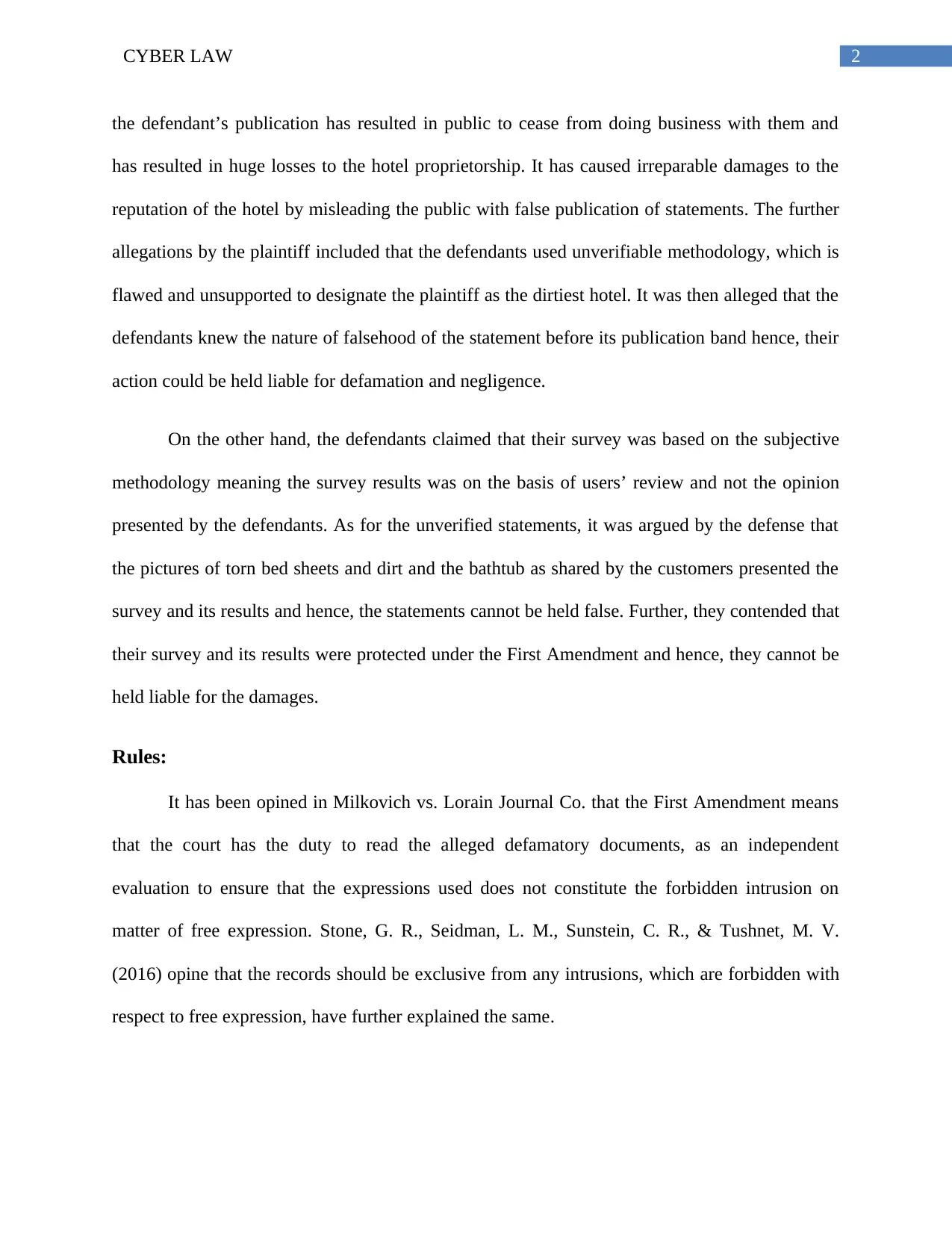
2CYBER LAW
the defendant’s publication has resulted in public to cease from doing business with them and
has resulted in huge losses to the hotel proprietorship. It has caused irreparable damages to the
reputation of the hotel by misleading the public with false publication of statements. The further
allegations by the plaintiff included that the defendants used unverifiable methodology, which is
flawed and unsupported to designate the plaintiff as the dirtiest hotel. It was then alleged that the
defendants knew the nature of falsehood of the statement before its publication band hence, their
action could be held liable for defamation and negligence.
On the other hand, the defendants claimed that their survey was based on the subjective
methodology meaning the survey results was on the basis of users’ review and not the opinion
presented by the defendants. As for the unverified statements, it was argued by the defense that
the pictures of torn bed sheets and dirt and the bathtub as shared by the customers presented the
survey and its results and hence, the statements cannot be held false. Further, they contended that
their survey and its results were protected under the First Amendment and hence, they cannot be
held liable for the damages.
Rules:
It has been opined in Milkovich vs. Lorain Journal Co. that the First Amendment means
that the court has the duty to read the alleged defamatory documents, as an independent
evaluation to ensure that the expressions used does not constitute the forbidden intrusion on
matter of free expression. Stone, G. R., Seidman, L. M., Sunstein, C. R., & Tushnet, M. V.
(2016) opine that the records should be exclusive from any intrusions, which are forbidden with
respect to free expression, have further explained the same.
the defendant’s publication has resulted in public to cease from doing business with them and
has resulted in huge losses to the hotel proprietorship. It has caused irreparable damages to the
reputation of the hotel by misleading the public with false publication of statements. The further
allegations by the plaintiff included that the defendants used unverifiable methodology, which is
flawed and unsupported to designate the plaintiff as the dirtiest hotel. It was then alleged that the
defendants knew the nature of falsehood of the statement before its publication band hence, their
action could be held liable for defamation and negligence.
On the other hand, the defendants claimed that their survey was based on the subjective
methodology meaning the survey results was on the basis of users’ review and not the opinion
presented by the defendants. As for the unverified statements, it was argued by the defense that
the pictures of torn bed sheets and dirt and the bathtub as shared by the customers presented the
survey and its results and hence, the statements cannot be held false. Further, they contended that
their survey and its results were protected under the First Amendment and hence, they cannot be
held liable for the damages.
Rules:
It has been opined in Milkovich vs. Lorain Journal Co. that the First Amendment means
that the court has the duty to read the alleged defamatory documents, as an independent
evaluation to ensure that the expressions used does not constitute the forbidden intrusion on
matter of free expression. Stone, G. R., Seidman, L. M., Sunstein, C. R., & Tushnet, M. V.
(2016) opine that the records should be exclusive from any intrusions, which are forbidden with
respect to free expression, have further explained the same.
⊘ This is a preview!⊘
Do you want full access?
Subscribe today to unlock all pages.

Trusted by 1+ million students worldwide
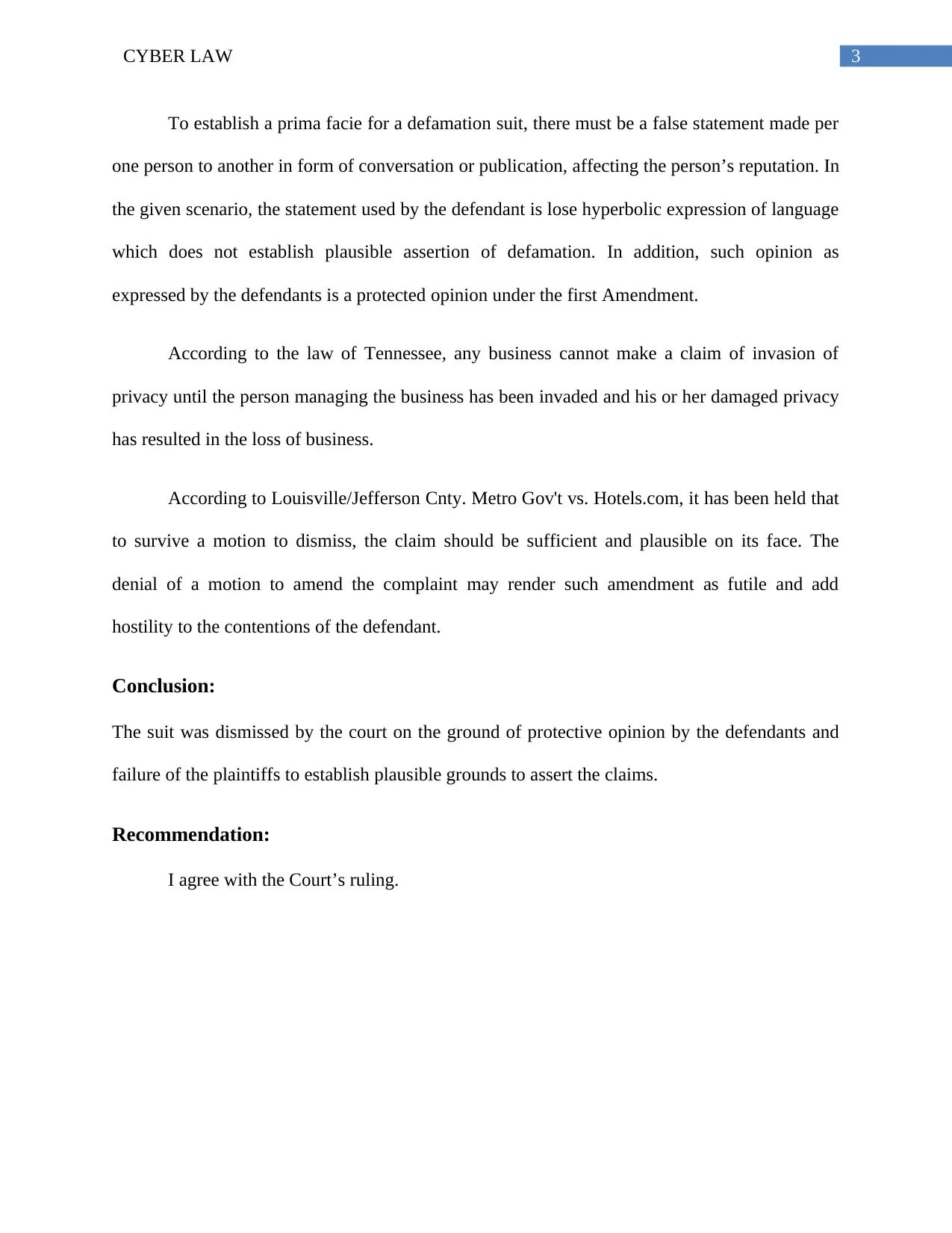
3CYBER LAW
To establish a prima facie for a defamation suit, there must be a false statement made per
one person to another in form of conversation or publication, affecting the person’s reputation. In
the given scenario, the statement used by the defendant is lose hyperbolic expression of language
which does not establish plausible assertion of defamation. In addition, such opinion as
expressed by the defendants is a protected opinion under the first Amendment.
According to the law of Tennessee, any business cannot make a claim of invasion of
privacy until the person managing the business has been invaded and his or her damaged privacy
has resulted in the loss of business.
According to Louisville/Jefferson Cnty. Metro Gov't vs. Hotels.com, it has been held that
to survive a motion to dismiss, the claim should be sufficient and plausible on its face. The
denial of a motion to amend the complaint may render such amendment as futile and add
hostility to the contentions of the defendant.
Conclusion:
The suit was dismissed by the court on the ground of protective opinion by the defendants and
failure of the plaintiffs to establish plausible grounds to assert the claims.
Recommendation:
I agree with the Court’s ruling.
To establish a prima facie for a defamation suit, there must be a false statement made per
one person to another in form of conversation or publication, affecting the person’s reputation. In
the given scenario, the statement used by the defendant is lose hyperbolic expression of language
which does not establish plausible assertion of defamation. In addition, such opinion as
expressed by the defendants is a protected opinion under the first Amendment.
According to the law of Tennessee, any business cannot make a claim of invasion of
privacy until the person managing the business has been invaded and his or her damaged privacy
has resulted in the loss of business.
According to Louisville/Jefferson Cnty. Metro Gov't vs. Hotels.com, it has been held that
to survive a motion to dismiss, the claim should be sufficient and plausible on its face. The
denial of a motion to amend the complaint may render such amendment as futile and add
hostility to the contentions of the defendant.
Conclusion:
The suit was dismissed by the court on the ground of protective opinion by the defendants and
failure of the plaintiffs to establish plausible grounds to assert the claims.
Recommendation:
I agree with the Court’s ruling.
Paraphrase This Document
Need a fresh take? Get an instant paraphrase of this document with our AI Paraphraser
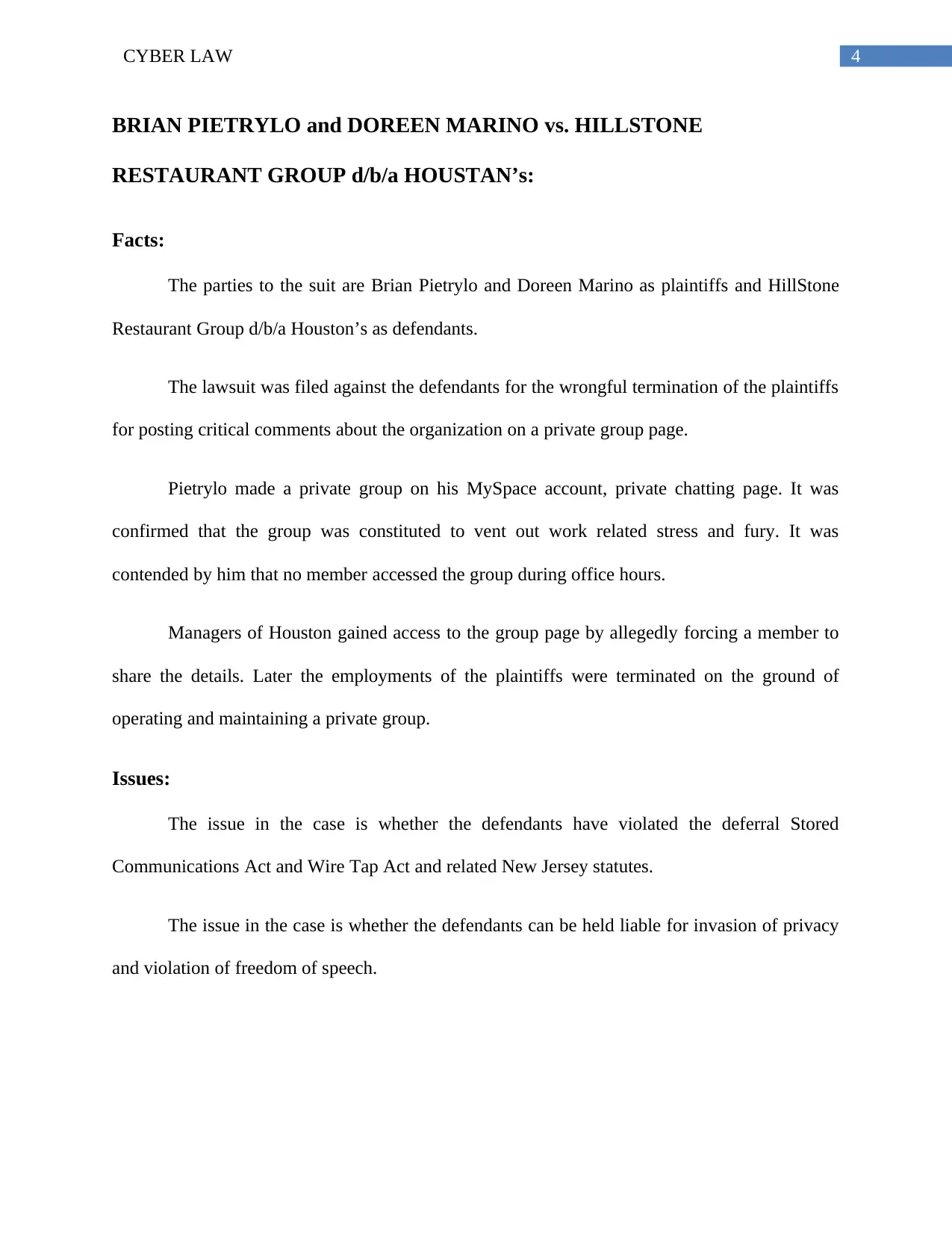
4CYBER LAW
BRIAN PIETRYLO and DOREEN MARINO vs. HILLSTONE
RESTAURANT GROUP d/b/a HOUSTAN’s:
Facts:
The parties to the suit are Brian Pietrylo and Doreen Marino as plaintiffs and HillStone
Restaurant Group d/b/a Houston’s as defendants.
The lawsuit was filed against the defendants for the wrongful termination of the plaintiffs
for posting critical comments about the organization on a private group page.
Pietrylo made a private group on his MySpace account, private chatting page. It was
confirmed that the group was constituted to vent out work related stress and fury. It was
contended by him that no member accessed the group during office hours.
Managers of Houston gained access to the group page by allegedly forcing a member to
share the details. Later the employments of the plaintiffs were terminated on the ground of
operating and maintaining a private group.
Issues:
The issue in the case is whether the defendants have violated the deferral Stored
Communications Act and Wire Tap Act and related New Jersey statutes.
The issue in the case is whether the defendants can be held liable for invasion of privacy
and violation of freedom of speech.
BRIAN PIETRYLO and DOREEN MARINO vs. HILLSTONE
RESTAURANT GROUP d/b/a HOUSTAN’s:
Facts:
The parties to the suit are Brian Pietrylo and Doreen Marino as plaintiffs and HillStone
Restaurant Group d/b/a Houston’s as defendants.
The lawsuit was filed against the defendants for the wrongful termination of the plaintiffs
for posting critical comments about the organization on a private group page.
Pietrylo made a private group on his MySpace account, private chatting page. It was
confirmed that the group was constituted to vent out work related stress and fury. It was
contended by him that no member accessed the group during office hours.
Managers of Houston gained access to the group page by allegedly forcing a member to
share the details. Later the employments of the plaintiffs were terminated on the ground of
operating and maintaining a private group.
Issues:
The issue in the case is whether the defendants have violated the deferral Stored
Communications Act and Wire Tap Act and related New Jersey statutes.
The issue in the case is whether the defendants can be held liable for invasion of privacy
and violation of freedom of speech.
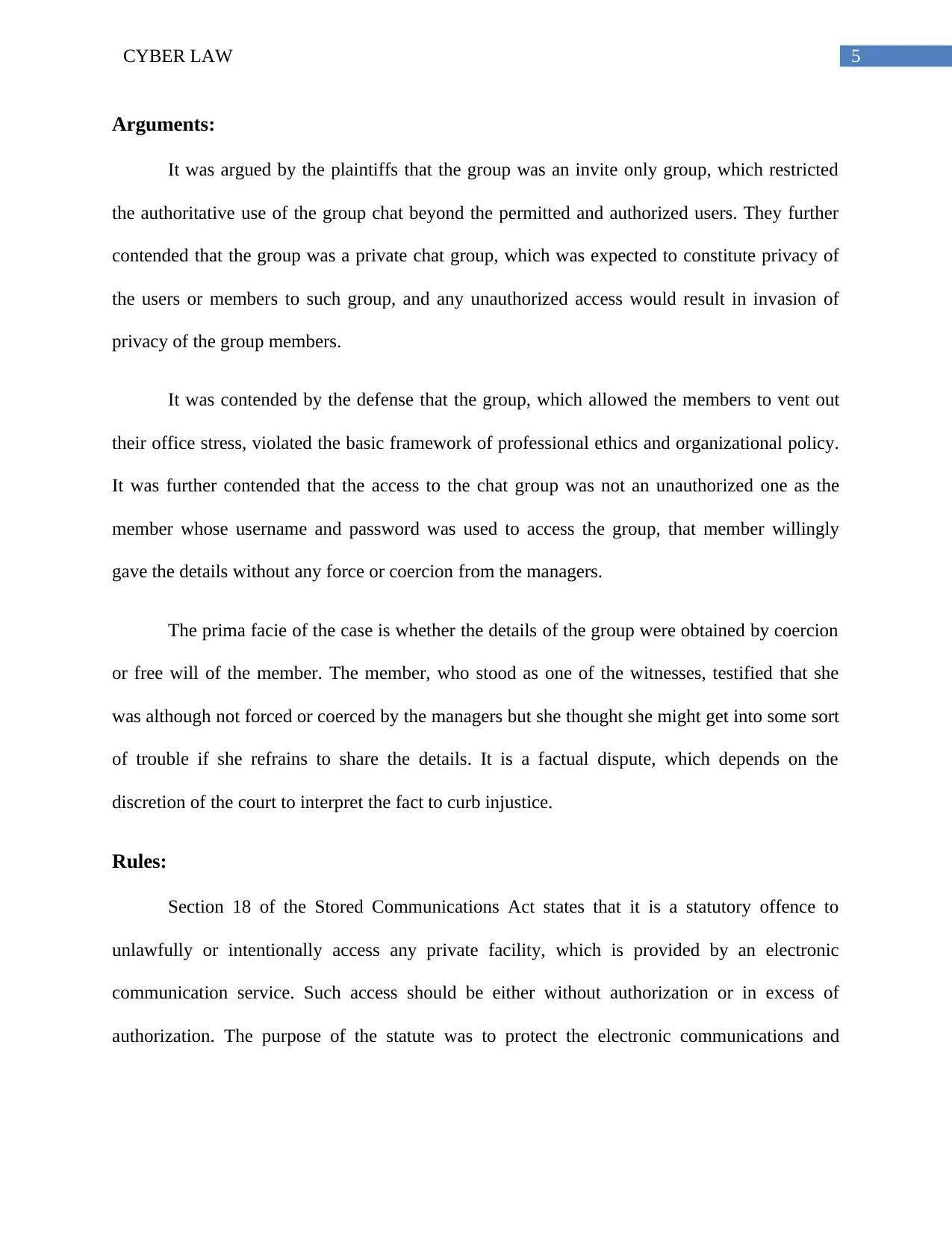
5CYBER LAW
Arguments:
It was argued by the plaintiffs that the group was an invite only group, which restricted
the authoritative use of the group chat beyond the permitted and authorized users. They further
contended that the group was a private chat group, which was expected to constitute privacy of
the users or members to such group, and any unauthorized access would result in invasion of
privacy of the group members.
It was contended by the defense that the group, which allowed the members to vent out
their office stress, violated the basic framework of professional ethics and organizational policy.
It was further contended that the access to the chat group was not an unauthorized one as the
member whose username and password was used to access the group, that member willingly
gave the details without any force or coercion from the managers.
The prima facie of the case is whether the details of the group were obtained by coercion
or free will of the member. The member, who stood as one of the witnesses, testified that she
was although not forced or coerced by the managers but she thought she might get into some sort
of trouble if she refrains to share the details. It is a factual dispute, which depends on the
discretion of the court to interpret the fact to curb injustice.
Rules:
Section 18 of the Stored Communications Act states that it is a statutory offence to
unlawfully or intentionally access any private facility, which is provided by an electronic
communication service. Such access should be either without authorization or in excess of
authorization. The purpose of the statute was to protect the electronic communications and
Arguments:
It was argued by the plaintiffs that the group was an invite only group, which restricted
the authoritative use of the group chat beyond the permitted and authorized users. They further
contended that the group was a private chat group, which was expected to constitute privacy of
the users or members to such group, and any unauthorized access would result in invasion of
privacy of the group members.
It was contended by the defense that the group, which allowed the members to vent out
their office stress, violated the basic framework of professional ethics and organizational policy.
It was further contended that the access to the chat group was not an unauthorized one as the
member whose username and password was used to access the group, that member willingly
gave the details without any force or coercion from the managers.
The prima facie of the case is whether the details of the group were obtained by coercion
or free will of the member. The member, who stood as one of the witnesses, testified that she
was although not forced or coerced by the managers but she thought she might get into some sort
of trouble if she refrains to share the details. It is a factual dispute, which depends on the
discretion of the court to interpret the fact to curb injustice.
Rules:
Section 18 of the Stored Communications Act states that it is a statutory offence to
unlawfully or intentionally access any private facility, which is provided by an electronic
communication service. Such access should be either without authorization or in excess of
authorization. The purpose of the statute was to protect the electronic communications and
⊘ This is a preview!⊘
Do you want full access?
Subscribe today to unlock all pages.

Trusted by 1+ million students worldwide
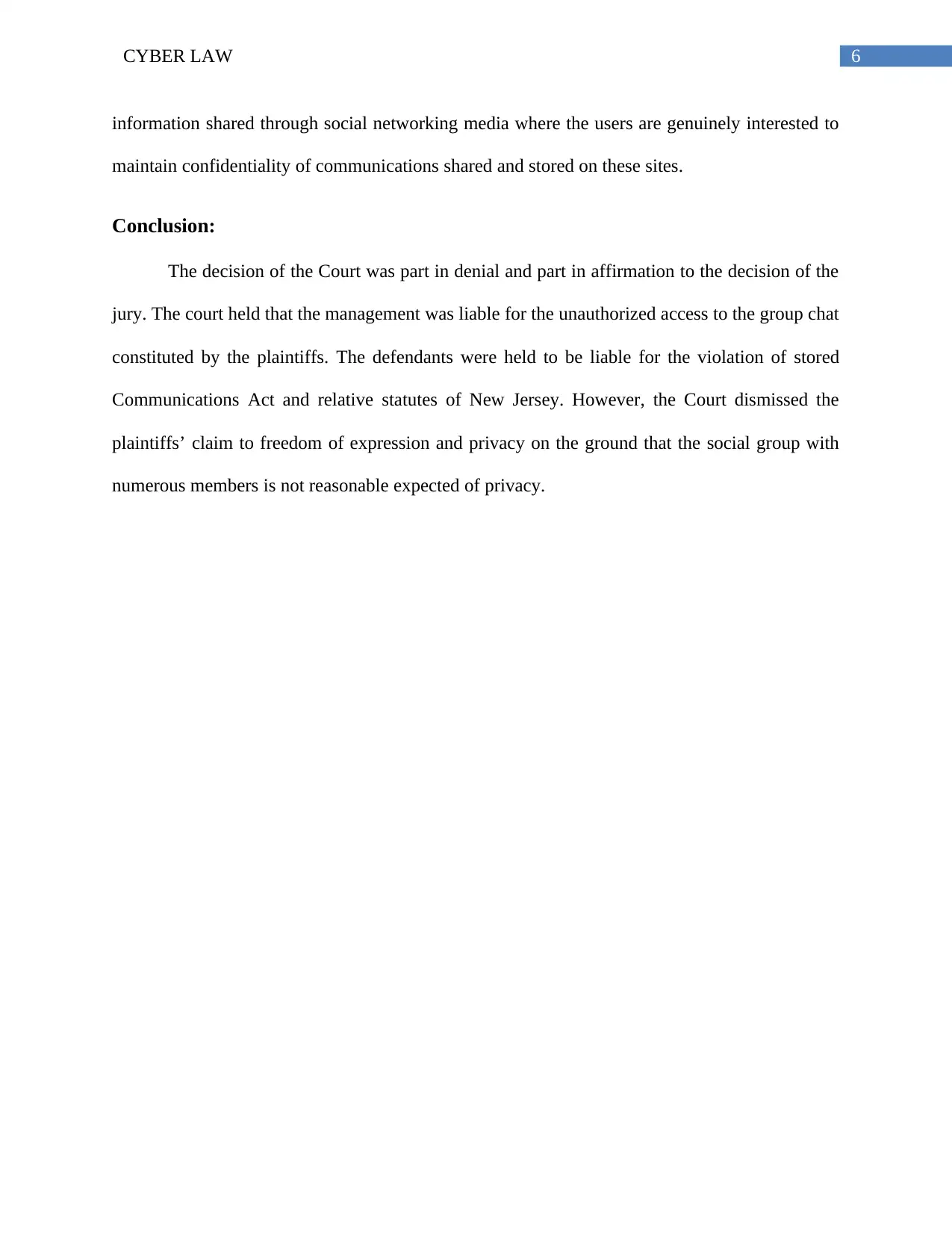
6CYBER LAW
information shared through social networking media where the users are genuinely interested to
maintain confidentiality of communications shared and stored on these sites.
Conclusion:
The decision of the Court was part in denial and part in affirmation to the decision of the
jury. The court held that the management was liable for the unauthorized access to the group chat
constituted by the plaintiffs. The defendants were held to be liable for the violation of stored
Communications Act and relative statutes of New Jersey. However, the Court dismissed the
plaintiffs’ claim to freedom of expression and privacy on the ground that the social group with
numerous members is not reasonable expected of privacy.
information shared through social networking media where the users are genuinely interested to
maintain confidentiality of communications shared and stored on these sites.
Conclusion:
The decision of the Court was part in denial and part in affirmation to the decision of the
jury. The court held that the management was liable for the unauthorized access to the group chat
constituted by the plaintiffs. The defendants were held to be liable for the violation of stored
Communications Act and relative statutes of New Jersey. However, the Court dismissed the
plaintiffs’ claim to freedom of expression and privacy on the ground that the social group with
numerous members is not reasonable expected of privacy.
Paraphrase This Document
Need a fresh take? Get an instant paraphrase of this document with our AI Paraphraser
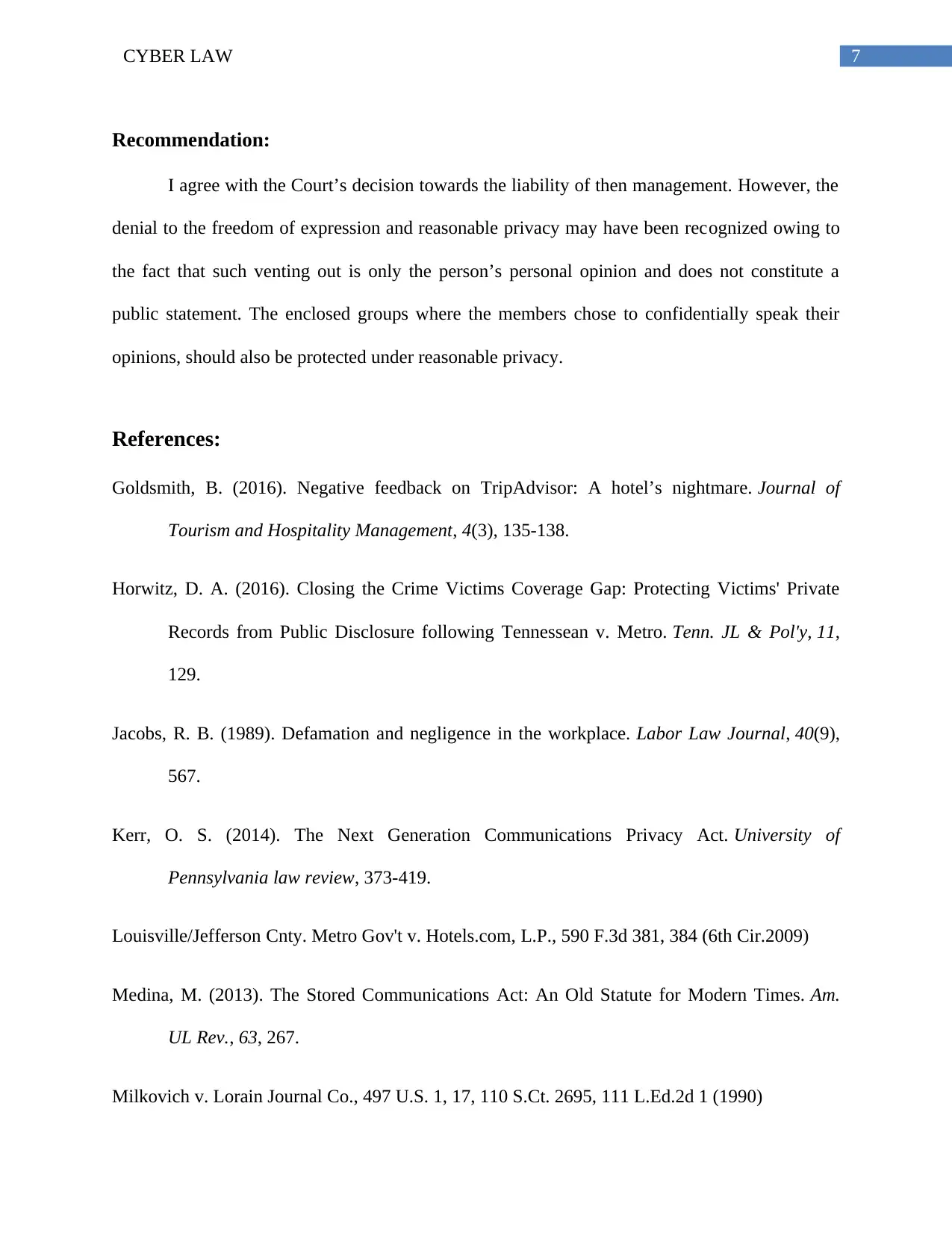
7CYBER LAW
Recommendation:
I agree with the Court’s decision towards the liability of then management. However, the
denial to the freedom of expression and reasonable privacy may have been recognized owing to
the fact that such venting out is only the person’s personal opinion and does not constitute a
public statement. The enclosed groups where the members chose to confidentially speak their
opinions, should also be protected under reasonable privacy.
References:
Goldsmith, B. (2016). Negative feedback on TripAdvisor: A hotel’s nightmare. Journal of
Tourism and Hospitality Management, 4(3), 135-138.
Horwitz, D. A. (2016). Closing the Crime Victims Coverage Gap: Protecting Victims' Private
Records from Public Disclosure following Tennessean v. Metro. Tenn. JL & Pol'y, 11,
129.
Jacobs, R. B. (1989). Defamation and negligence in the workplace. Labor Law Journal, 40(9),
567.
Kerr, O. S. (2014). The Next Generation Communications Privacy Act. University of
Pennsylvania law review, 373-419.
Louisville/Jefferson Cnty. Metro Gov't v. Hotels.com, L.P., 590 F.3d 381, 384 (6th Cir.2009)
Medina, M. (2013). The Stored Communications Act: An Old Statute for Modern Times. Am.
UL Rev., 63, 267.
Milkovich v. Lorain Journal Co., 497 U.S. 1, 17, 110 S.Ct. 2695, 111 L.Ed.2d 1 (1990)
Recommendation:
I agree with the Court’s decision towards the liability of then management. However, the
denial to the freedom of expression and reasonable privacy may have been recognized owing to
the fact that such venting out is only the person’s personal opinion and does not constitute a
public statement. The enclosed groups where the members chose to confidentially speak their
opinions, should also be protected under reasonable privacy.
References:
Goldsmith, B. (2016). Negative feedback on TripAdvisor: A hotel’s nightmare. Journal of
Tourism and Hospitality Management, 4(3), 135-138.
Horwitz, D. A. (2016). Closing the Crime Victims Coverage Gap: Protecting Victims' Private
Records from Public Disclosure following Tennessean v. Metro. Tenn. JL & Pol'y, 11,
129.
Jacobs, R. B. (1989). Defamation and negligence in the workplace. Labor Law Journal, 40(9),
567.
Kerr, O. S. (2014). The Next Generation Communications Privacy Act. University of
Pennsylvania law review, 373-419.
Louisville/Jefferson Cnty. Metro Gov't v. Hotels.com, L.P., 590 F.3d 381, 384 (6th Cir.2009)
Medina, M. (2013). The Stored Communications Act: An Old Statute for Modern Times. Am.
UL Rev., 63, 267.
Milkovich v. Lorain Journal Co., 497 U.S. 1, 17, 110 S.Ct. 2695, 111 L.Ed.2d 1 (1990)
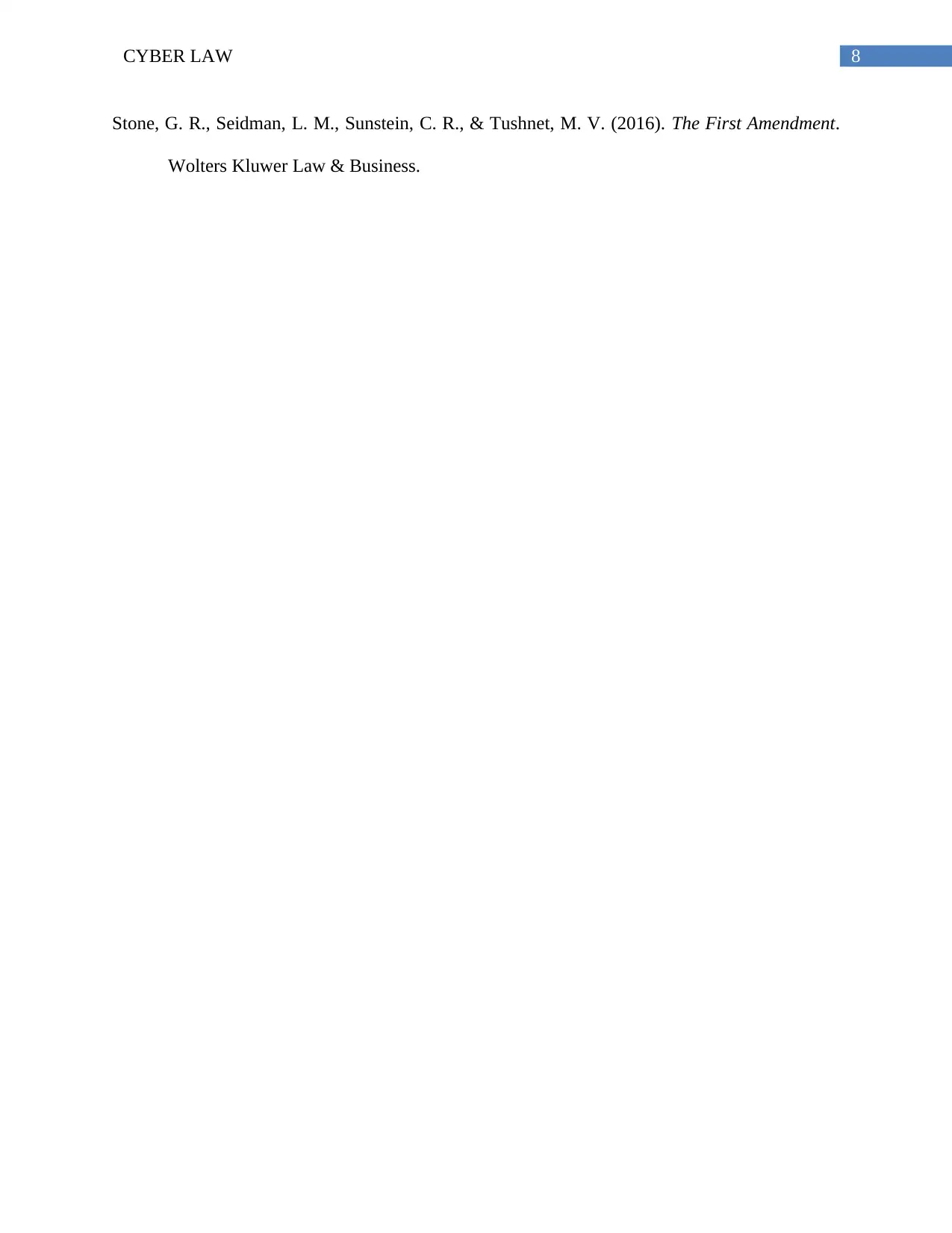
8CYBER LAW
Stone, G. R., Seidman, L. M., Sunstein, C. R., & Tushnet, M. V. (2016). The First Amendment.
Wolters Kluwer Law & Business.
Stone, G. R., Seidman, L. M., Sunstein, C. R., & Tushnet, M. V. (2016). The First Amendment.
Wolters Kluwer Law & Business.
⊘ This is a preview!⊘
Do you want full access?
Subscribe today to unlock all pages.

Trusted by 1+ million students worldwide
1 out of 9
Your All-in-One AI-Powered Toolkit for Academic Success.
+13062052269
info@desklib.com
Available 24*7 on WhatsApp / Email
![[object Object]](/_next/static/media/star-bottom.7253800d.svg)
Unlock your academic potential
Copyright © 2020–2026 A2Z Services. All Rights Reserved. Developed and managed by ZUCOL.
